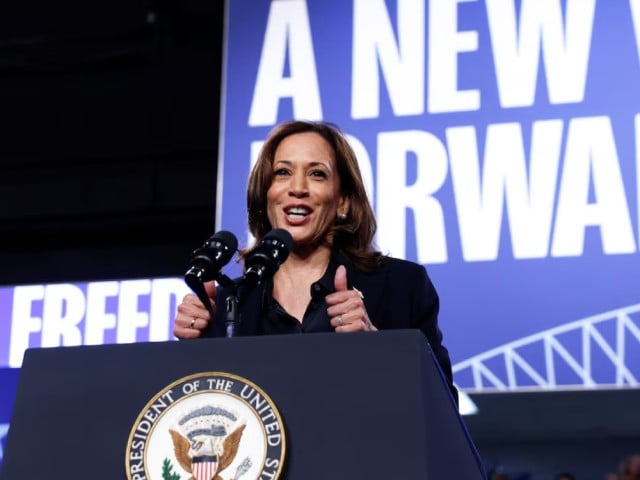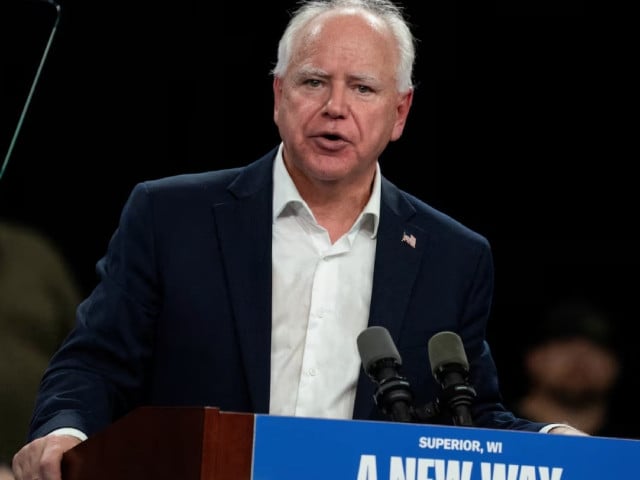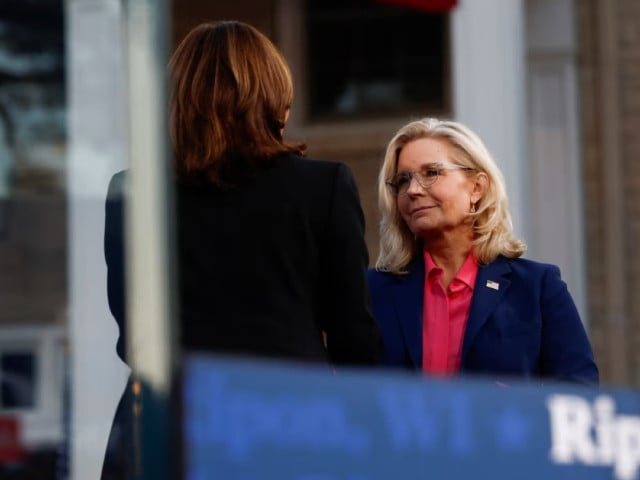
Vice President Kamala Harris met with Arab American and Muslim leaders in Michigan on October 4, 2024, as her presidential campaign faces mounting pressure from these communities, frustrated with US policy toward Israel's ongoing military actions in Gaza and Lebanon.
The meeting took place in Flint, a key stop in Harris’ campaign tour through Michigan, a state that could prove pivotal in the upcoming November election.
During the meeting, Harris expressed her concern over the rising civilian casualties in Gaza and Lebanon and the humanitarian crisis resulting from Israel's military invasion.
More than 2,000 people killed so far in Israel’s attacks across Lebanon, including 127 children and 261 women while in Gaza, at least 41,802 people have been killed and 96,844 injured in Israeli attacks since October 2023.
She also discussed efforts to prevent a broader regional conflict while working toward a ceasefire.
However, participants in the meeting, including Wa’el Alzayat, CEO of Emgage Action, expressed disappointment with what they described as the administration's failure to sufficiently address the violence and suffering in the region.
Alzayat, whose organisation works to increase Muslim American political engagement, said the group urged Harris to use her influence to push for an immediate ceasefire and to reset US policy in the Middle East.
“Emgage Action asked Vice President Harris to impress upon President Biden the urgency of bringing an immediate end to the violence,” he said. “She agrees that this war needs to end.”
Ed Gabriel, president of the American Task Force on Lebanon, echoed these concerns, highlighting the need for a ceasefire and US support in addressing the humanitarian crisis in Lebanon, where thousands have been displaced.
Gabriel said that while the meeting was constructive and Harris showed compassion, the community wants to see tangible policy changes.
“We want her to push the president to end the war. We want her to commit to ending the war if she becomes president. We want her to speak directly to our communities about the pain and suffering,” Gabriel said.
Although some attendees appreciated the opportunity for dialogue, others declined the invitation. Jim Zogby, founder of the Arab American Institute and a longtime Democratic National Committee member, turned down the meeting, citing what he saw as the administration’s focus on optics rather than addressing the core concerns of Arab American voters.
Zogby, who has been vocal about his criticism of Biden's Middle East policies, said the meeting did little to reassure a community that feels increasingly alienated.
“There was no ground broken. I wasn’t quite sure what the intent was other than to just say … that they met with leaders,” Zogby said, noting that the ongoing violence in Gaza and Lebanon has left many Arab Americans feeling that their concerns are not being adequately addressed.
“With Lebanon in flames, they’ve got a bigger job. And I don’t think they’re ready to handle it,” he added.
Hala Hijazi, a longtime friend of Harris who has lost dozens of family members in Gaza, was invited but unable to attend.
The absence of some high-profile leaders, including those from the Uncommitted National Movement, a protest campaign against Biden’s policies in the Middle East, further underscored the deep divisions within the Arab American community regarding Harris' candidacy.
The Uncommitted National Movement, which emerged during the Democratic primaries, has openly criticized the administration’s support for Israel’s military operations and warned that Harris’ continued alignment with Biden’s policies could cost her significant support in key states like Michigan.
Abbas Alawieh, a co-founder of the movement, confirmed that his group was not invited to the meeting and expressed skepticism that Harris would meaningfully distance herself from Biden’s policies.
Arab Americans are a significant voting bloc in Michigan, and Harris’ campaign has made multiple efforts in recent days to win back their support.
On Thursday, Harris’ running mate, Minnesota Governor Tim Walz, spoke with Muslim voters during a virtual town hall, promising that they would have an equal role in a Harris administration.
Harris’ national security adviser, Phil Gordon, also met with Arab and Muslim leaders earlier in the week to discuss the administration’s efforts to de-escalate then war in Gaza and Lebanon.
Despite these efforts, many Arab Americans remain critical of Harris’ stance.
Ali Dagher, a Lebanese American attorney and community leader in Michigan, expressed deep frustration, saying that Harris’ refusal to fully distance herself from Biden’s policies could be a decisive factor in the election.
“Harris is going to lose Michigan,” Dagher said. “I will not be voting for Kamala Harris. No one I know will vote for her. I cannot find a single person in the community who supports her.”
According to a recent poll conducted by the Arab American Institute, both Harris and Trump are tied in support among Arab American voters.
This is a significant shift from 2020 when Arab Americans overwhelmingly backed Biden.
The potential loss of this key demographic could have profound implications for Harris’ chances in Michigan, a state Biden narrowly won in the previous election.
While Harris expressed understanding of the concerns raised by Arab American leaders in Flint, she did not make any concrete promises regarding a shift in US policy toward Israel.
The vice president did, however, emphasize the need for an end to the violence and pledged to work with Arab and Muslim communities to address their concerns.
“We heard a lot of compassion on her side. We’ll see what happens,” Gabriel said after the meeting. “This was a valuable two-sided exchange, and we made important progress in our relationship. We're going to continue to meet."
However, as Harris continues her campaign, it remains unclear whether these efforts will be enough to win back Arab American voters in Michigan and other key states.
Many in the community feel that without a significant policy shift, their support for Harris may dwindle, further complicating her path to victory in 2024.







1728115453-0/Untitled-design-(34)1728115453-0-270x192.webp)
1728112074-0/Untitled-design-(51)1728112074-0-270x192.webp)

1728091668-0/Princess-D-(1)1728091668-0-270x192.webp)








COMMENTS
Comments are moderated and generally will be posted if they are on-topic and not abusive.
For more information, please see our Comments FAQ